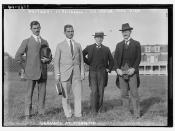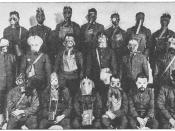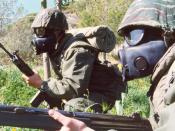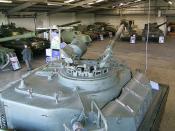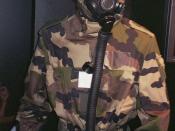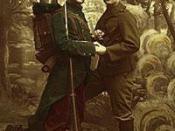-The Trenches of Cambria, France- It is a cold winter day in December of 1917 on the edge of Cambria. I am a war correspondent assigned to accompany a group of British soldiers in their stationed trench. This is what I observed.
It was dirty very uncomfortable and many of the men lacked the necessary amount of sleep and/or nourishment. In most cases, due to the lack of quality or amount of food, cigarettes and liquor replaced any need of nourishment. Any time of peace or not fighting in the trench was hard to be cherished. Due to the fear of knowing that they may have to fight, or that they could be dead in any given second, many soldiers held dearly to their life and lived in distress. Waiting for every moment, and living each minute like it was their last, these soldiers still had to think fast, plan, and use their most difficult skills and strategies to survive.
Even the best trained soldier had much to fear, for it didn't take much to wipe out hundreds of soldiers at a time with machine guns, bombs, tanks, zeppelins, and lethal gas. There was nothing that most of these helpless men could do but to sit there and accept death. Many of these soldiers would not accept death; they would not take death as an answer. They refused to plan death anywhere in their future. This is what kept most men strong: pretending that they were invincible.
Attacks were expected daily, soldiers never knew when they would need to fight. These situations and many long hard days at war, to many men were extremely stressful. Lethal weapons that could cause sudden death out of the soldier's hands were highly feared. One lethal weapon such as mustard gas was typically used by surprise against soldiers in trenches. On this particular day, the gas was delivered by shells fired from a German tank. The gas was easy to be detected when soldiers or commanders noticed their men or surrounding animals dropping like flies. Dead horses were swollen to enormous size; This was caused by the lungs swelling and bursting due to the inhalation of the gas. Dead birds with bulging eyes and stiffened claws were seen everywhere. Once it was detected that there was gas in the area, inhalation was able to be avoided by the use or gas masks, mouthpieces, nose clips and such. These supplies and masks were being handed out left and right. The gas was known to cause heavy casualties in the forward sections of tanks. Soldiers who came in contact with the gas, if they were lucky, returned with only their eyes swollen and weeping, and faces and their knees heavily blistered. Members of the crew wore their masks during the greater part of the day, and their eyes were sore, their throats dry.
After just a few hours of tiring, life threatening battle, the crew had suffered many causalities. The remaining survivors along with myself had to evacuate the area and retreat into the woods. Luckily, the German tanks did not follow. The British soldiers were safe for another day.
